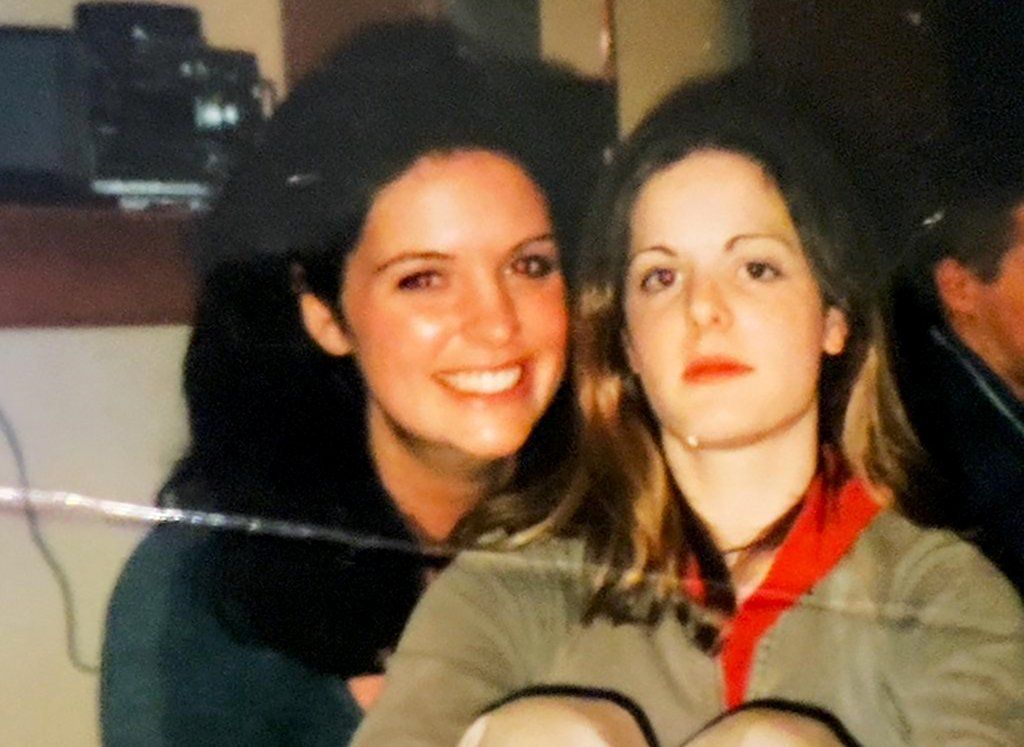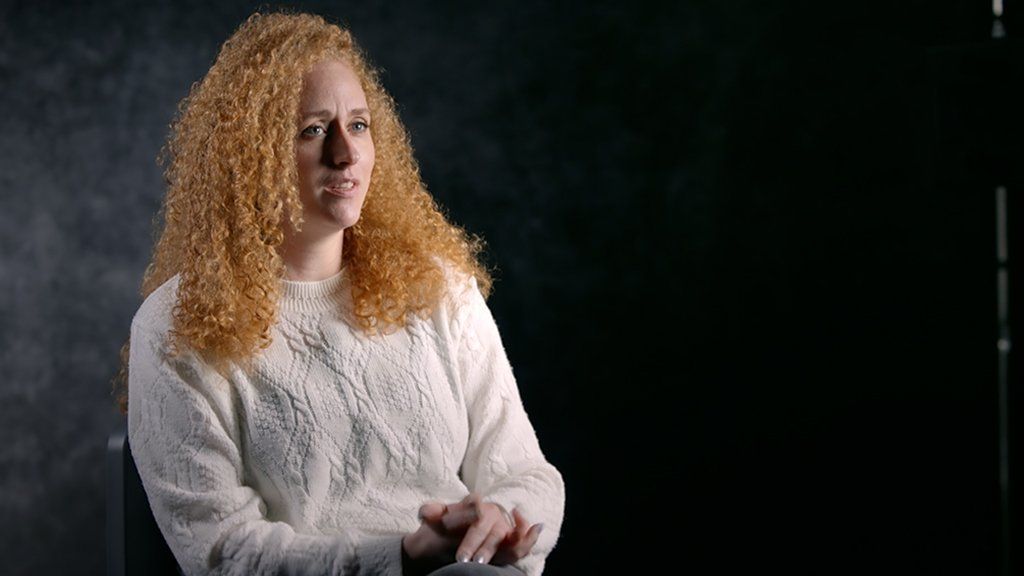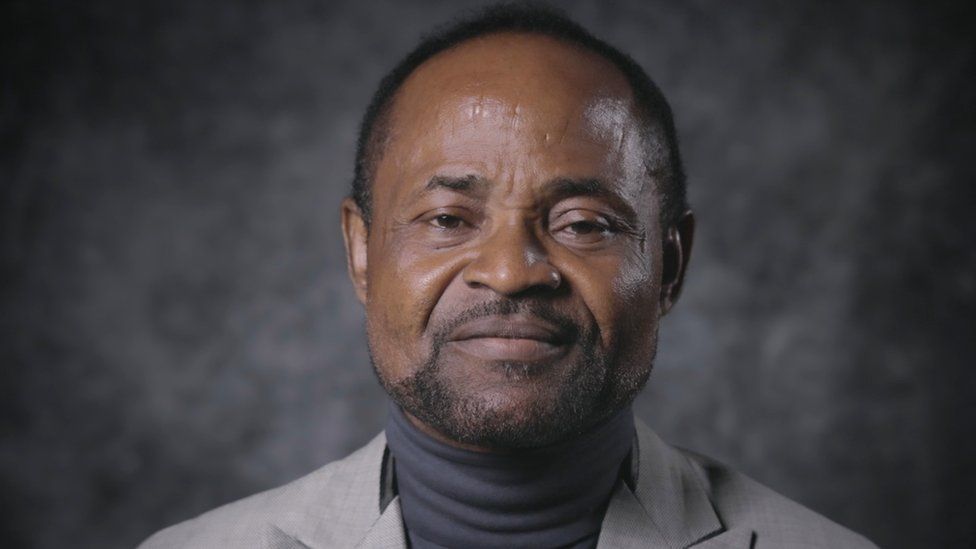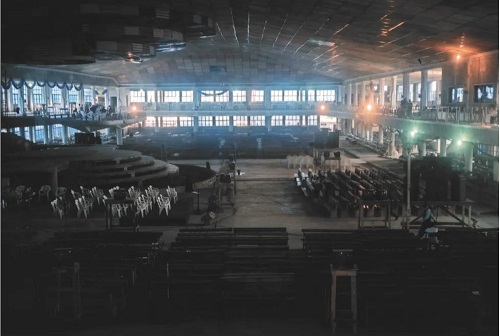TB Joshua, a charismatic Nigerian leader of one of the world's biggest evangelical churches, secretly committed sexual crimes on a mass scale, a BBC investigation spanning three continents has found. Testimony from dozens of survivors suggests Joshua was abusing and raping young women from around the world several times a week for nearly 20 years.
Warning: Contains accounts of torture, rape and self-harm
In early 2002, in the depths of a grey English winter, 21-year-old Rae disappeared.
The last time many of her friends saw her was at university in Brighton. She had been studying graphic design, living in a shared house 25 minutes from the sea. Rae was bright and popular.
"For me, it was like she died, but I couldn't grieve her," says Carla, Rae's best friend at the time.
Carla knew where Rae had gone. But the truth of it was hard to explain to their friends. A few weeks previously, she and Rae had travelled to Nigeria together, in search of a mysterious man who could seemingly heal people with his hands. He was a Christian pastor, with a black beard, in white robes. His name was TB Joshua. His followers called him "The Prophet".
Rae and Carla planned to visit his church, the Synagogue Church of All Nations [Scoan], for just one week. But Rae never came home. She had moved into Joshua's compound.
"I left her there," says Carla, tears flowing freely. "Never will I ever forgive myself for that."
The church looms like a gothic temple over the Ikotun neighbourhood in Lagos, Africa's largest city. Joshua designed all 12 storeys of the compound adjoining it, where he lived alongside many of his followers. He oversaw the construction of the multiple staircases to his bedroom. The three doors to it, in and out. The hidden prayer room full of tiny mirrors. The "clinic" downstairs.
We have interviewed many people who lived inside. They paint a picture of a concrete labyrinth; a nightmarish world where reality slipped away and horrors unfolded.
Numerous women say they were sexually assaulted by Joshua, with a number claiming they were repeatedly raped behind closed doors. Some say they were forced to have abortions after becoming pregnant.

Today, Rae is back in England, living in a beautiful hamlet in the countryside. She's smiley and laughs freely, but there's something restless about her.
"On the outside I look normal, but I'm not," she says.
When Rae talks about her years in Lagos, her lips tighten. She talks breathlessly. At times, the colour visibly drains from her face. She spent 12 years inside Joshua's compound.
"This story is like a horror story. It's like something you watch in fiction, but it's true."
The two-year investigation, in collaboration with international media platform Open Democracy, has involved more than 15 BBC journalists across three continents. They gathered archive video recordings, documents, and hundreds of hours of interviews to corroborate Rae's testimony and uncover further harrowing stories. More than 25 eyewitnesses and alleged victims, from the UK, Nigeria, Ghana, US, South Africa and Germany, have provided accounts of what it was like inside Joshua's compound, with the most recent experiences in 2019.
The Synagogue Church of All Nations did not respond to the allegations, but said previous claims have been unfounded.
Former followers have previously tried to speak out about abuse, but say they have been silenced or discredited by Scoan, and two say they were physically assaulted. When the BBC's Africa Eye was filming outside the church, a security guard shot above the heads of the crew after they refused to hand over their material.
Many of our interviewees have waived their legal right to anonymity, in most cases asking just their surnames be omitted. Others asked that their identities remain hidden for fear of reprisals.
The man at the heart of Scoan is regarded as one of the most influential pastors in African history. He died, unexpectedly, in June 2021, just days after many of our first interviews were recorded. On the day of his funeral, Lagos ground to a halt as mourning crowds packed the streets.
Nigerian pastor TB Joshua speaks at his Lagos megachurch on 31 December, 2014.
Some 50,000 people would attend Joshua's services every week, and the church became a top site for foreign visitors to Nigeria. His global television and social media empire was among the most successful Christian networks in the world, with millions of viewers spanning Europe, the Americas, South East Asia and Africa. His YouTube channel had hundreds of millions of views.
The church is still popular today, led by his widow Evelyn and a new team of disciples.
An interview with Nelson Mandela's daughter in 2013 shows a portrait of Joshua sitting on the former president of South Africa's desk. In his lifetime, Joshua attracted dozens of politicians and celebrities to his church, including sporting legends such as Chelsea FC striker Didier Drogba and at least nine African presidents.
Many of his followers were drawn by his philanthropy, but most came for his so-called miracles. Joshua systematically filmed spectacular "healings" throughout his career. After Joshua prayed for them, individuals on camera testified to being cured of ailments ranging from cancer and HIV/Aids, to chronic migraines and blindness.
"We'd never… seen anything like that before," says Solomon Ashoms, a journalist who covers African religion.
"The mysteries that he had, the secrets that he carried, [were] what people followed."
A number of Joshua's videos show men with severely infected genitals, which burst open and then miraculously heal when he raises his arm in prayer. Others show women struggling to give birth, who instantaneously deliver their children when Joshua approaches. After each event, those involved would testify to being saved.
Video tapes of Joshua's healings were circulating among evangelical churches throughout Europe and Africa in the late 1990s and early 2000s.
Rae, who had grown up with conservative Christian values, was inspired to travel to Lagos after watching these videos, shown to her by a South African acquaintance.
"I was gay and I didn't want to be," she says. "I thought: 'Well, maybe this is the answer to my problems. Maybe this man can straighten me out. Like if he prays for me, I won't be gay any more.'"
Another British woman, Anneka, from Derby, in the Midlands, says she was also entranced by the videos.

"The whole room went completely still," she says, describing the moment her church congregation first encountered the tapes when she was 16.
"This is what Jesus would have done," she remembers thinking. She, too, went on to travel to Nigeria.
Neither Rae nor Anneka, nor many of the young people who left their home countries to meet Joshua in the early 2000s, paid for their tickets. Church groups across England raised funds to send pilgrims to Lagos to witness these miracles - and Joshua contributed Scoan money himself, senior former church insiders say. Later, once the church was well established, he charged high prices for pilgrims to come and stay.
Bisola, a Nigerian who spent 14 years inside the compound, says courting Westerners was a key tactic.
"He used the white people to market his brand," she says.
Former insiders estimate Joshua made tens of millions of dollars from pilgrims and other money streams - fundraising, video sales, and stadium appearances abroad. He rose from poverty to become one of Africa's richest pastors.

"That guy [was] a genius," says Agomoh Paul, a man once regarded as Joshua's number two in the church, who left after 10 years in the compound.
"Everything… [he did was] planned out."
A major part of this planning was the faking of the "miracles" says Agomoh Paul, which he says he oversaw.
He and other sources say that those "cured" had often been paid to perform or exaggerate their symptoms before their supposed healing took place. In some cases, they say, people had been unknowingly drugged or given medicine to improve their conditions while at the church, and later persuaded to give testimony about their recovery. Others were falsely told they had tested positive for HIV/Aids and that, thanks to Joshua's ministrations, they had now become virus-free.
When Rae landed in the seething heat of Lagos, she saw miracles too. Dozens of people came and testified to having been healed of serious illnesses.
"I had a really involuntary reaction. I just broke down in floods of tears," she says.
It was then that Rae was chosen. Joshua singled her out to become a "disciple" - an elite group of followers who served him and lived with him inside his compound.
Rae thought she was going to study under Joshua, to "cure" her sexuality, to learn how to heal people.
The reality was very different.
"We all thought we were in heaven, but we were in hell," she says. "And in hell terrible things happen."
BBC





